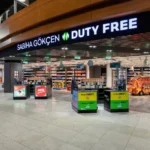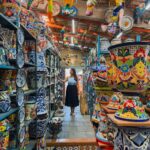A Shopping Journey Across Turkey
Turkey’s diverse landscapes are matched only by its varied shopping experiences. Each city offers a distinct flavor of Turkish commerce, from the ancient covered bazaars of Istanbul to the bohemian boutiques of coastal Bodrum and the cave workshops of Cappadocia. As you travel through this magnificent country, shopping becomes not just an activity but a journey through Turkey’s cultural heritage, artistic traditions, and contemporary creative energy.
This city-by-city guide will take you through Turkey’s premier shopping destinations, highlighting the unique experiences each location offers. Whether you’re hunting for handcrafted souvenirs, designer fashions, or authentic local products, you’ll discover where to find the very best that Turkish merchants have to offer.
Istanbul: Where East Meets West in a Shopper’s Paradise
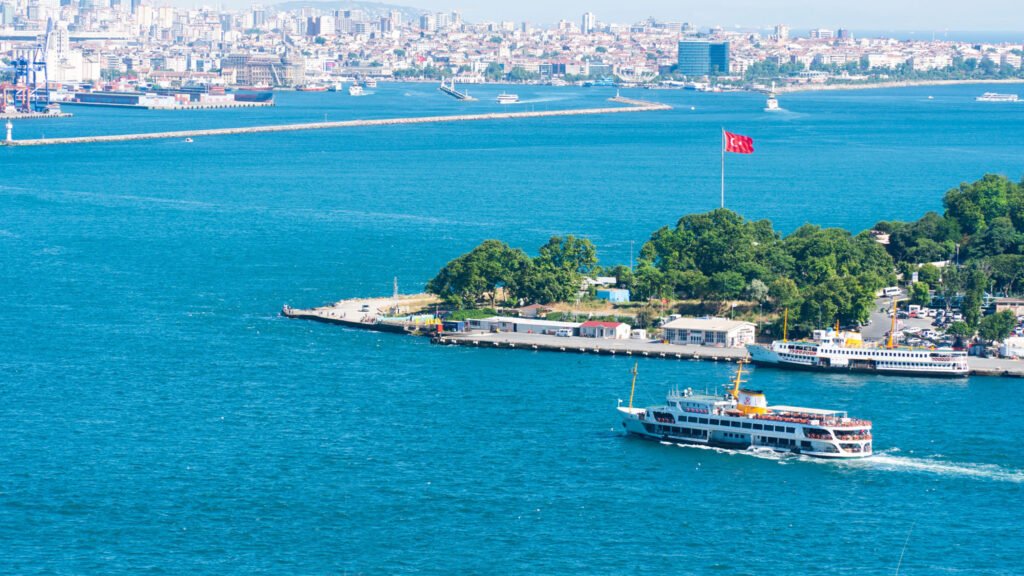
As the historic bridge between Europe and Asia, Istanbul offers the country’s most diverse and extensive shopping scene. The city seamlessly blends centuries-old market traditions with contemporary retail experiences.
Historic Markets and Bazaars
The Grand Bazaar (Kapalı Çarşı)
This 15th-century covered market is one of the world’s oldest and largest, The Grand Bazaar has over 4,000 shops spread across 61 streets and 18 gates. Getting lost here is part of the experience.
What to buy: Gold jewelry, carpets, leather goods, ceramics, textiles, and antiques
Local insight: The bazaar is organized roughly by product type. For example, Kalpakçılar Caddesi is known as the “Gold Street,” while Sahaflar Çarşısı specializes in books and prints. Venture beyond the main thoroughfares to find better prices and more authentic experiences.
Hours: Monday to Saturday, 8:30 AM to 7:00 PM (Closed Sundays)
How to get there: Tram to Beyazıt-Kapalıçarşı or Çemberlitaş stops
The Spice Bazaar (Mısır Çarşısı)
Smaller but equally atmospheric, the 17th-century Spice Bazaar dazzles visitors with pyramids of colorful spices, aromatic teas, and sweet Turkish delights.
What to buy: Spices, Turkish delight, dried fruits, nuts, teas, and honey
Local insight: The shops inside the bazaar cater primarily to tourists. For better prices on the same products, explore the surrounding streets, particularly in the Tahtakale area, where locals shop.
Hours: Monday to Sunday, 8:00 AM to 7:00 PM
How to get there: Tram to Eminönü stop
Arasta Bazaar
Located behind the Blue Mosque, this smaller, more manageable market offers higher-quality goods with less aggressive selling tactics than the Grand Bazaar.
What to buy: Textiles, ceramics, and quality souvenirs
Local insight: This is home to Jennifer’s Hamam, known for organic cotton products, and several reputable carpet dealers.
Hours: Daily, 9:00 AM to 7:00 PM
How to get there: Walking distance from Sultanahmet tram stop
Contemporary Shopping Districts
İstiklal Avenue and Beyoğlu
This bustling pedestrian boulevard stretches for 1.4 kilometers through the heart of modern Istanbul, lined with Turkish and international brands, concept stores, and historic passages (arcades).
What to buy: Contemporary Turkish fashion, books, music, and design items
Don’t miss: The historic passages branching off İstiklal, including Çiçek Pasajı, Atlas Pasajı, and Hazzopulo Pasajı, each with unique shops and atmosphere.
Hours: Most shops open 10:00 AM to 10:00 PM daily
How to get there: Tünel funicular or metro to Taksim Square
Nişantaşı
Istanbul’s most upscale shopping district features tree-lined streets with luxury brands, high-end Turkish designers, and elegant cafes.
What to buy: Designer fashion, jewelry, and home goods
Local designers to look for: Vakko, Beymen, Machka, and Arzu Kaprol
Hours: Most shops open 10:00 AM to 8:00 PM, Monday to Saturday
How to get there: Metro to Osmanbey station
Karaköy
Once a neglected docklands area, Karaköy has transformed into one of Istanbul’s hippest neighborhoods, with concept stores, artisanal shops, and designer boutiques.
What to buy: Independent Turkish designer pieces, contemporary crafts, and unique souvenirs
Don’t miss: Muhittin Mah, a street filled with jewelry workshops where you can find unique, handcrafted pieces.
Hours: Most shops open 11:00 AM to 8:00 PM
How to get there: Tram to Karaköy stop
Hidden Gems for Serious Shoppers
Çukurcuma
This neighborhood of winding streets is known for its antique shops and vintage stores, made famous by Nobel Prize-winning author Orhan Pamuk’s “Museum of Innocence.”
What to buy: Antiques, vintage items, retro Turkish objects, and unique home decor
Local insight: Prices here are generally fixed, but gentle negotiation is still possible for larger purchases.
Hours: Most shops open 11:00 AM to 7:00 PM, closed Sundays
How to get there: Walk downhill from İstiklal Avenue or uphill from Tophane tram stop
Kadıköy and Moda (Asian Side)
These vibrant neighborhoods on Istanbul’s Asian shore offer a more local shopping experience with independent boutiques, concept stores, and excellent food markets.
What to buy: Contemporary Turkish design, vintage clothing, records, and gourmet food products
Don’t miss: Kadıköy Market (Çarşı), a network of streets filled with food shops, cafes, and local businesses
Hours: Most shops open 10:00 AM to 8:00 PM
How to get there: Ferry from Eminönü or Karaköy to Kadıköy
For more detailed information about what to buy in Istanbul and throughout Turkey, see our comprehensive “Turkey Shopping Guide: What to Buy and Where to Find the Best Deals”.
If you’re a fan of shopping malls, check out these two articles: Best Shopping Malls in Istanbul and Best Outlet Malls in Istanbul your ultimate guides to retail therapy in the city.
Cappadocia: Artisanal Shopping in a Fairy-Tale Landscape

The otherworldly landscape of Cappadocia, with its fairy chimneys and cave dwellings, provides a unique backdrop for shopping experiences focused on local crafts and traditions.
Göreme: The Tourist Hub
The main town of Göreme offers numerous shops along its central streets, selling everything from mass-produced souvenirs to authentic local crafts.
What to buy: Onyx stone products, evil eye amulets, ceramics, and textiles
Local insight: Quality varies dramatically between shops. The most authentic items are often found in smaller workshops slightly off the main tourist drag.
Best shops:
- Tribal Collections Nomadic Rugs & Textiles: Specializing in authentic kilims and textiles from Turkish nomadic tribes
- Galerie Ikman: Famous for its photogenic carpet displays and quality textiles
- Sultan Carpets: Family-run business with excellent reputation for fair prices
Hours: Most shops open 9:00 AM to 9:00 PM during tourist season
Avanos: The Pottery Center
This town has been a center for pottery and ceramics since Hittite times, with clay sourced from the Red River (Kızılırmak) that runs through it.
What to buy: Hand-painted ceramics, pottery, and decorative tiles
Unique experience: Many workshops offer pottery-making demonstrations and hands-on experiences where you can try throwing a pot on the wheel.
Best workshops:
- Chez Galip: Run by master potter Galip Körükçü, known for his hair museum and quality ceramics
- Güray Museum Workshop: Combined underground museum and active pottery workshop
- Omurlu Ceramic: Family workshop producing high-quality traditional designs
Hours: Most workshops open 8:00 AM to 7:00 PM
How to get there: 15-minute drive from Göreme; regular minibuses connect the towns
Ürgüp: More Authentic Shopping
Less touristy than Göreme, Ürgüp offers a more relaxed shopping experience with some excellent boutiques and workshops.
What to buy: Carpets, wine from local vineyards, and onyx stone products
Local insight: Ürgüp has some of Cappadocia’s best carpet shops, with more reasonable prices than Göreme.
Best shops:
- Hakan Carpet and Kilim: Excellent selection with knowledgeable staff
- Turasan Winery: Local wines from Cappadocia’s volcanic soil
- Özler Onyx Factory: Quality stone products with workshop tours available
Hours: Most shops open 9:00 AM to 7:00 PM
How to get there: 10-minute drive from Göreme; regular minibuses available
Unique Cave Shopping Experiences
One of Cappadocia’s most distinctive features is its cave shops, where merchandise is displayed in spaces carved from the region’s soft tufa rock.
What to buy: Carpets and textiles (the neutral temperature and humidity of cave environments are ideal for textile display)
Best cave shops:
- Sentez Cave Carpet: Beautiful cave showroom with quality carpets
- Sultan Cave Carpets: Atmospheric cave setting with excellent selection
- Guray Ceramic: Pottery workshop and showroom in a cave setting
Local insight: The unique acoustics and lighting of cave shops create a magical shopping atmosphere, particularly for carpet viewing.
Antalya: Mediterranean Shopping with a View
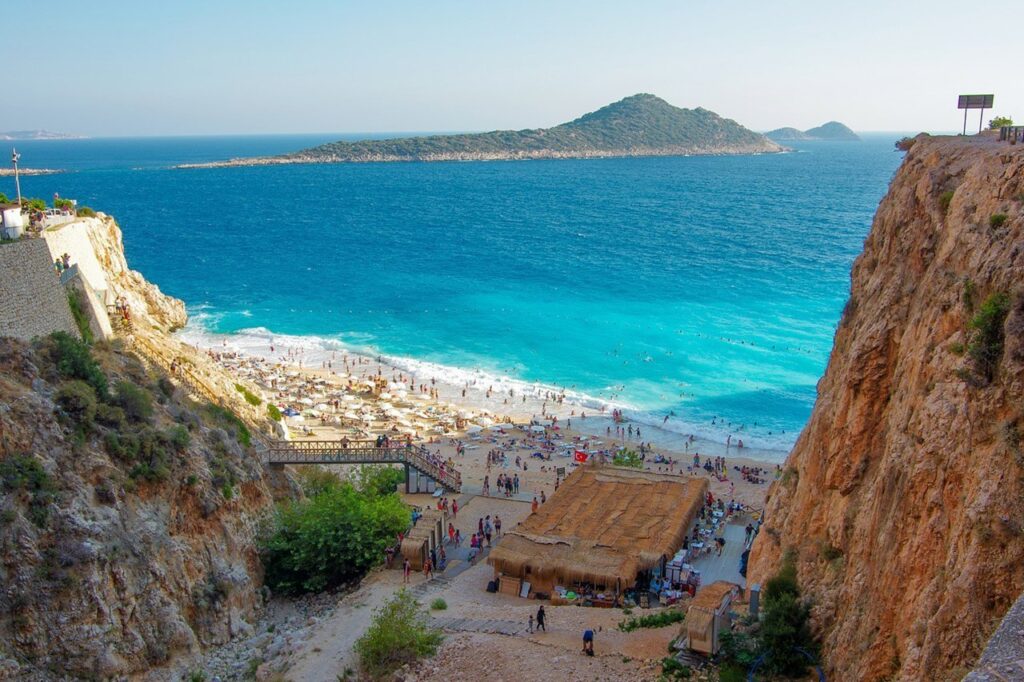
Turkey’s premier Mediterranean destination combines historic charm with modern amenities, offering diverse shopping experiences against a backdrop of sea and mountains.
Kaleiçi (Old Town)
The historic heart of Antalya features narrow winding streets filled with shops selling everything from souvenirs to quality leather goods and jewelry.
What to buy: Leather products, jewelry, spices, and souvenirs
Local insight: Prices here tend to be higher than in other parts of Antalya, but the atmospheric setting makes it worth exploring.
Best areas:
- Hesapçı Sokak: The main shopping street through the old town
- Harbor area: Shops with Mediterranean views
- Kırk Merdiven (Forty Steps): Connecting the marina to the old town, lined with small shops
Hours: Most shops open 9:00 AM to 11:00 PM during tourist season
How to get there: Tram to Kalekapısı stop
Modern Shopping Centers
For contemporary shopping, Antalya offers several modern malls with international and Turkish brands.
Where to go:
- MarkAntalya: Central location with 130 stores and entertainment options
- Mall of Antalya: Large mall with premium brands and excellent food court
- TerraCity: Upscale shopping center with designer brands and gourmet market
What to buy: International fashion brands, Turkish designer clothing, electronics, and cosmetics
Hours: Typically 10:00 AM to 10:00 PM daily
Local Markets
Antalya hosts several weekly markets selling fresh produce, textiles, and household goods.
Best markets:
- Old Town Bazaar: Daily covered market near Hadrian’s Gate
- Meltem District Market: Held on Tuesdays, popular with locals
- Lara District Market: Wednesday market with good textile section
What to buy: Fresh fruits, spices, textiles, and inexpensive clothing
Local insight: Arrive early (before 10:00 AM) for the best selection and more comfortable shopping before the heat of the day.
Bodrum: Aegean Chic and Coastal Treasures
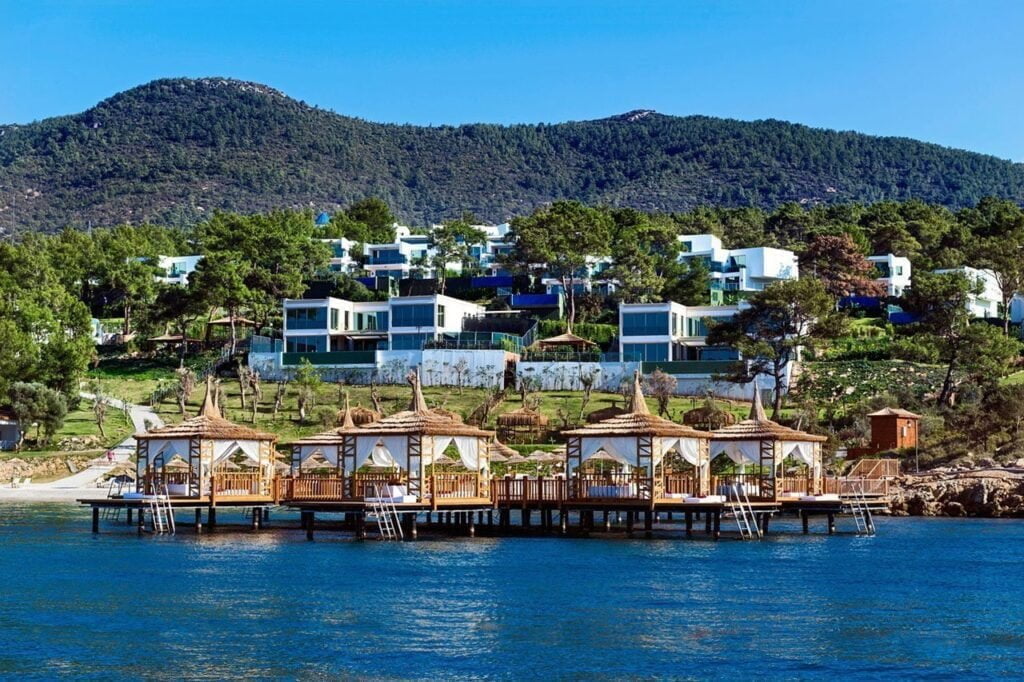
This glamorous peninsula combines traditional Turkish markets with upscale boutiques, creating a shopping scene as diverse as its visitors.
Bodrum Town Center
The heart of Bodrum features a mix of tourist shops, local boutiques, and international brands.
What to buy: Resort wear, beachwear, sandals, and maritime-themed souvenirs
Best areas:
- Neyzen Tevfik Caddesi: Main shopping street with fashion boutiques
- Bar Street area: Tourist-oriented shops open late
- Marina area: Upscale boutiques and designer stores
Hours: Most shops open 10:00 AM to midnight during summer season
Bodrum Markets
The peninsula hosts excellent markets selling everything from fresh produce to textiles and souvenirs.
Best markets:
- Bodrum Tuesday Market: The largest, with hundreds of stalls selling textiles, clothing, and souvenirs
- Bodrum Friday Market: More food-focused, with excellent local produce
- Turgutreis Saturday Market: Worth the trip for its authentic atmosphere and good prices
What to buy: Cotton textiles, olive oil products, herbs, and local handicrafts
Local insight: The Tuesday market has two sections—one more tourist-oriented, the other more for locals. Explore both for the full experience.
Upscale Shopping Areas
Bodrum has emerged as a luxury destination, with high-end shopping to match.
Where to go:
- Palmarina Bodrum: Luxury marina in Yalikavak with designer boutiques
- Bodrum Midtown: Shopping center with premium Turkish and international brands
- Türkbükü: Exclusive area with designer boutiques and concept stores
What to buy: Designer fashion, luxury accessories, and high-end home goods
Hours: Most upscale shops open 10:00 AM to 10:00 PM during season
Izmir: Authentic Aegean Shopping
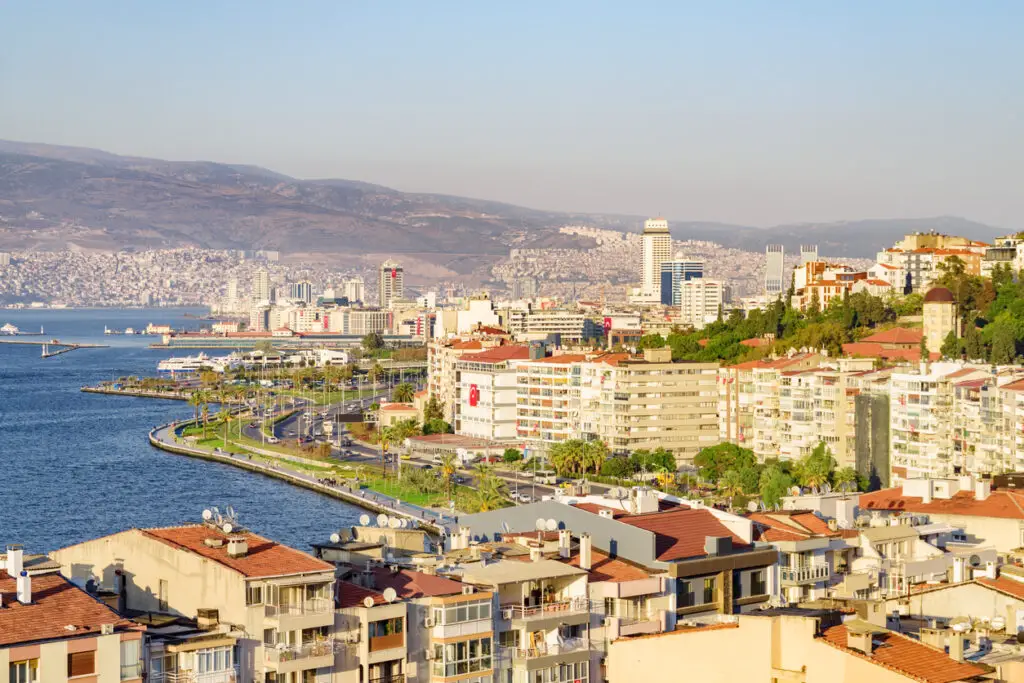
Turkey’s third-largest city offers a more authentic shopping experience than tourist-heavy destinations, with excellent markets and local products.
Kemeraltı Bazaar
This historic market district dates back to the 17th century and remains the commercial heart of Izmir, with thousands of shops spread across a labyrinth of streets and passages.
What to buy: Textiles, spices, coffee, local delicacies, and gold jewelry
Local insight: This is primarily a market for locals, so prices are reasonable and bargaining less aggressive than in tourist areas.
Best sections:
- Havra Sokağı: Jewish quarter with unique shops and cafes
- Kızlarağası Hanı: Ottoman caravanserai filled with souvenir shops
- Bakır Bedesteni: Specializing in copper products
Hours: Monday to Saturday, 8:30 AM to 7:00 PM (mostly closed Sundays)
How to get there: Metro to Çankaya station
Alsancak
This modern district features pedestrian shopping streets with Turkish and international brands.
What to buy: Contemporary fashion, books, and design items
Best areas:
- Kıbrıs Şehitleri Caddesi: Main shopping street with cafes and boutiques
- Kordon: Seafront promenade with shops and restaurants
Hours: Most shops open 10:00 AM to 8:00 PM
How to get there: Metro to Alsancak station
Local Markets
Izmir hosts excellent neighborhood markets throughout the week.
Best markets:
- Bostanlı Market: Held on Saturdays, known for quality produce and textiles
- Havra Sokağı Sunday Market: Antiques and vintage items
- Bornova Market: Wednesday market popular with locals
What to buy: Aegean olive products, dried fruits, herbs, and textiles
Bursa: Silk Road Legacy
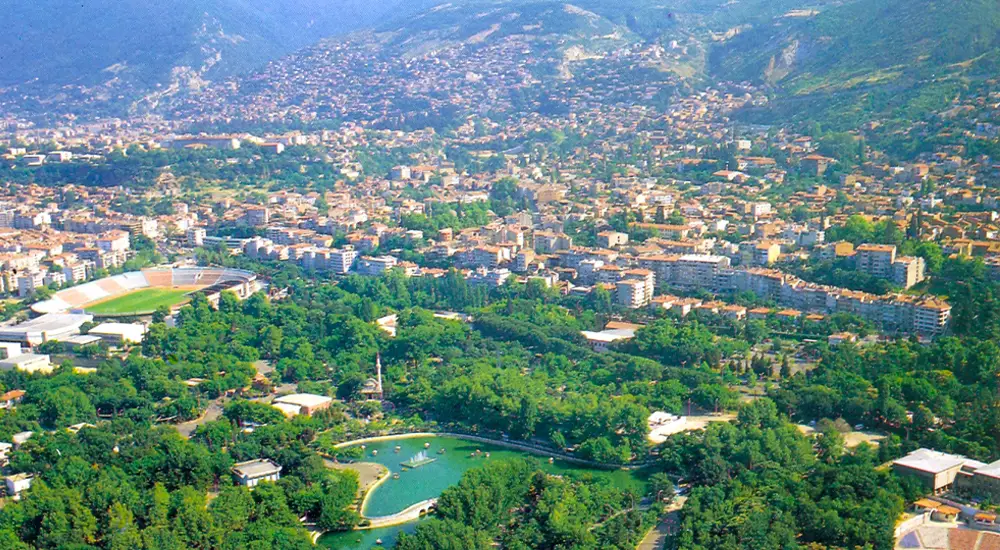
Bursa is the first capital of the Ottoman Empire and still retains its historic importance as a center of silk production and trade. I personally visit this wonderful city at least three times a year, where I enjoy its rich diversity — from snowy mountains and hidden caves to stunning waterfalls and historic bazaars
Koza Han (Silk Market)
This beautifully preserved 15th-century caravanserai remains the center of Bursa’s silk trade, with shops selling silk products surrounding a courtyard with a central fountain and tea garden.
What to buy: Silk scarves, textiles, and garments
Local insight: The upper floor shops often offer better prices than ground level.
Hours: Monday to Saturday, 9:00 AM to 7:00 PM
How to get there: Central location in the historic district
Covered Bazaar (Kapalı Çarşı)
Bursa’s historic covered market consists of several interconnected hans (caravanserais) specializing in different products.
What to buy: Textiles, towels, traditional knives, and local specialties like chestnut candies
Best sections:
- Bakırcılar Çarşısı: Coppersmith market
- Eski Aynalı Çarşı: Restored historic section with quality shops
Hours: Monday to Saturday, 9:00 AM to 7:00 PM
Factory Outlets
As a major textile production center, Bursa offers excellent factory outlets for Turkish brands.
Where to go:
- Bursa Textile Factory Outlet Center: Collection of factory stores
- Özdilek Outlet Center: Major Turkish home textile brand
What to buy: Towels, bathrobes, bed linens, and clothing at discounted prices
Konya: Mystical Shopping
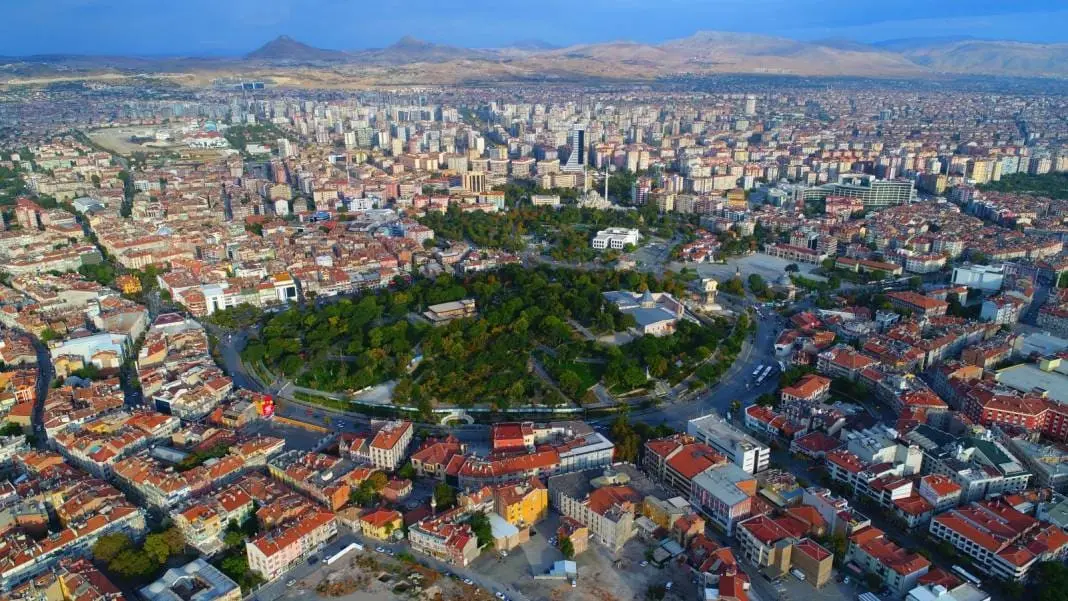
This conservative city in central Anatolia is known as the home of the whirling dervishes and offers shopping experiences focused on traditional crafts and religious items.
Mevlana Souvenir Area
The streets surrounding the Mevlana Museum (tomb of the poet Rumi) are filled with shops selling related souvenirs and religious items.
What to buy: Whirling dervish figurines, calligraphy, prayer beads, and books on Sufism
Hours: Daily, 9:00 AM to 7:00 PM
Bedesten (Covered Bazaar)
This historic market in the city center offers a range of traditional products.
What to buy: Carpets, traditional clothing, copper items, and local food products
Hours: Monday to Saturday, 9:00 AM to 7:00 PM
Gaziantep: Culinary Shopping Paradise
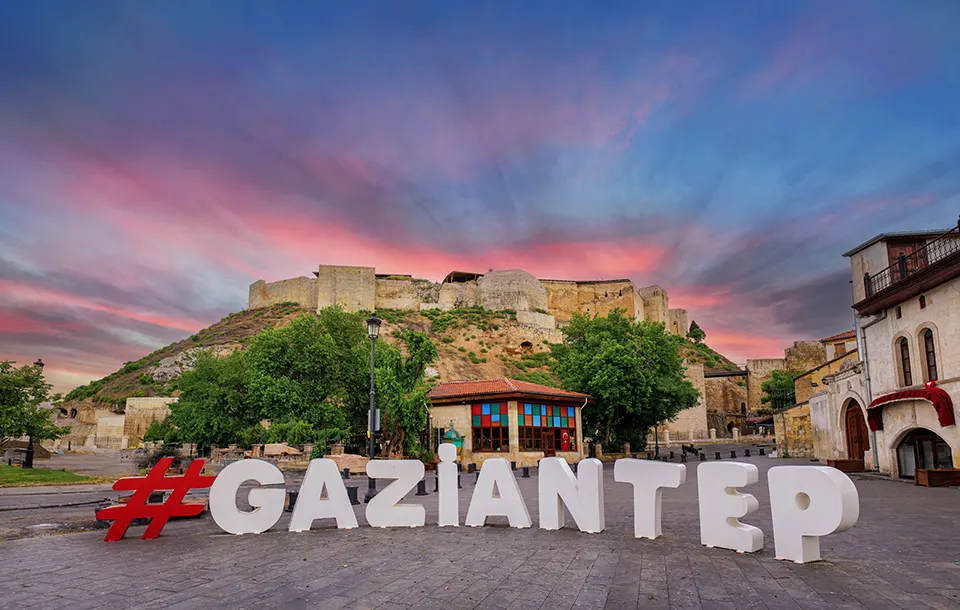
This southeastern city is renowned for its cuisine and offers exceptional food shopping opportunities.
Almacı Pazarı (Copper Market)
Historic market specializing in handcrafted copper items, particularly those used in traditional cooking.
What to buy: Copper cookware, coffee pots (cezve), and decorative items
Local insight: Watch artisans at work in their small workshops around the market.
Hours: Monday to Saturday, 8:30 AM to 7:00 PM
Baklava and Pistachio Shops
Gaziantep is famous for its pistachio baklava and offers numerous specialty shops.
What to buy: Baklava, pistachios, and other local sweets
Best shops:
- İmam Çağdaş: Legendary establishment for baklava and kebabs
- Koçak: Award-winning baklava shop
- Metanet: Excellent quality nuts and dried fruits
- Hours: Most shops open 8:00 AM to 10:00 PM
Practical Shopping Tips by City
Istanbul
- Best time to shop: Weekday mornings to avoid crowds
- Areas to avoid: Be cautious around Aksaray and parts of Laleli after dark
- Tax refund: Major shops participate in the Global Blue tax refund program
Cappadocia
- Best time to shop: Shoulder season (April-May or September-October) for better service and prices
- Shipping: Most carpet shops offer reliable international shipping
- Authenticity: For ceramics, visit Avanos workshops rather than tourist shops in Göreme
Antalya
- Best time to shop: Morning or evening to avoid midday heat
- Seasonal considerations: Many shops in tourist areas close or reduce hours during winter
- Bargaining: Expected in the Old Town but not in shopping malls
Bodrum
- Best time to shop: Tuesday morning for the market; evening for boutiques
- Seasonal considerations: Many upscale shops only open during summer season (May-October)
- Local products: Look for Bodrum mandarins and tangerine products as unique local souvenirs
Izmir
- Best time to shop: Weekday mornings in Kemeraltı for a more relaxed experience
- Local specialties: Boyoz (pastry), kumru (sandwich), and local olive oils
- Transportation:The metro system makes it easy to reach shopping areas
FAQs About Shopping in Turkish Cities
What are the typical shopping hours in Turkish cities?
Most shops in tourist areas open around 9:00 AM and close between 7:00 PM and 10:00 PM, with later hours during summer. Shopping malls typically operate from 10:00 AM to 10:00 PM daily. Traditional markets and bazaars often close earlier (around 7:00 PM) and may be closed or have limited hours on Sundays.
Which city in Turkey is best for carpet shopping?
Istanbul offers the widest selection, but Cappadocia provides a more relaxed shopping experience with good quality and often better prices. For specific regional styles, consider Konya for Central Anatolian designs, Bergama for Aegean styles, or Hereke for fine silk carpets.
Are prices fixed or negotiable in Turkish shops?
It depends on the type of establishment. Bargaining is expected in bazaars, markets, and small tourist shops. Prices are fixed in department stores, shopping malls, and most boutiques. As a general rule, if there’s no price tag visible, the price is probably negotiable.
What’s the best city for authentic, non-touristy shopping in Turkey?
Izmir offers an excellent balance of shopping infrastructure with a more authentic, local experience. The Kemeraltı Bazaar caters primarily to locals, resulting in more reasonable prices and less aggressive selling tactics than tourist-heavy destinations.
Can I find international brands in Turkey?
Yes, especially in Istanbul, Ankara, Izmir, and Antalya. Major shopping malls carry most international brands, often at prices comparable to or slightly higher than European countries. Istanbul’s İstiklal Avenue and Nişantaşı district are particularly good for international shopping
Conclusion
hopping in Turkey’s diverse cities offers more than just the opportunity to acquire unique items—it provides a window into the country’s rich cultural tapestry. From the historic bazaars of Istanbul to the cave workshops of Cappadocia and the coastal boutiques of Bodrum, each shopping experience tells a story about Turkey’s traditions, craftsmanship, and evolving contemporary identity.
As you travel between these distinctive cities, take time to appreciate not just what you’re buying, but the centuries of tradition behind each craft, the regional variations in style and technique, and the personal stories of the artisans and merchants you meet along the way.
For more information about specific products to look for during your Turkish shopping adventures, see our “Turkey Shopping Guide: What to Buy and Where to Find the Best Deals”. If you’re particularly interested in finding authentic souvenirs with cultural significance, our “Authentic Turkish Souvenirs: The Complete Shopping Guide” provides detailed guidance.
To understand the cultural context of shopping in Turkey, including bargaining etiquette and price expectations, check out “Shopping in Turkey: Prices, Bargaining Tips, and What to Expect”. And if you’re making significant purchases, don’t miss our “Turkey Shopping Tax Refund Guide: How to Get Your VAT Back” to save money on your Turkish treasures.

